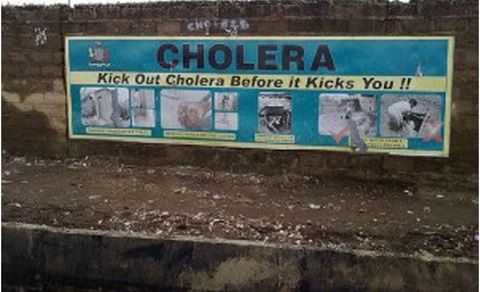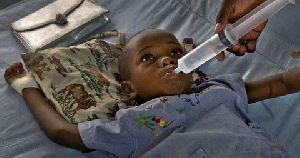The Central Regional capital, Cape Coast is a fishing port and one of the most historical cities in Ghana, founded by the people of Oguaa and is situated on its south to the Gulf of Guinea.
According to 2010 population census, Cape Coast had a settlement population of 169,894 people. Cape Coast is a humid area with mean monthly relative humidity varying between 85% and 99%. The area is dominated by batholith rock and is generally undulating with steep slopes. Tourist sites include the Cape Coast castle, Kakum National Park, Hans cottage among several others.
Despite the above exciting description, the city has suffered a major setback on health related development. Problems such as bad sanitation, cholera outbreaks are plethoric in recent times. This feature will focus on the cholera outbreak which has come to public eye lately with inhabitants of Cape Coast seeking perpetual solution. Cholera still remain a big threat to public health and is a key indicator of poor environmental and personal hygiene, inadequate sanitation and lack of social development in the affected areas.
The re-emergence of cholera has been noted in Akotokyira, Pedu, Abura and other suburbs of Cape Coast parallel with the ever-increasing size of vulnerable populations living in areas with poor or unsanitary conditions.
During the national cholera crises in 2014. Cape Coast recorded 2,874 cases of which 60 people lost their lives. With this, there was a remote possibility that we would be rescued in subsequent years by putting tentative measures on board.

In the year 2015. Cholera was somehow brought under control as there was no death out of the eight (8) reported cases.
Maxwell Attah, a freelance journalist who took a keen interest in the recent outbreak reported that at the middle of the 45th week of the year, 157 cholera cases have been reported in Cape Coast with Abura being the hotspot. Despite the immense number of people contracted with the infection, no death has been recorded since the outbreak on October 21, 2016.
At the end of the same week, University of Cape Coast (UCC) Hospital has recorded 36 confirm cholera cases. Other available statistics unveiled that Cape Coast Teaching Hospital is the first Hospital to have reported a confirm case.
An infected person admitted at the later Hospital who spoke with Maxwell Attah on anonymity said she experience a watery diarrhoea after she ate a food (waakye) that she purchased at Abura, subsequently leading to her diagnosis.
CHOLERA is an infectious and often fatal bacterial disease cause by Vibrio cholerae. Which is a Gram-negative, comma-shaped bacterium.
CAUSES
Some of the causes include:
Open defecation in Water bodies.
consuming Vegetables grown with water containing infected human wastes.
consuming Raw or undercooked fish and seafood caught in waters polluted with sewage.
SYMPTOMS
cholera symptoms could be mild or severe and begins as soon as a few hours or as long as five (5) days after infection. About one in 20 people infected have severe watery diarrhea accompanied by vomiting, which can quickly lead to dehydration and a possible shock or death if left untreated in some hours. Although many infected people may have minimal or no symptoms, they can still contribute to spread of the infection.
TREATMENT
According to Health Experts, the treatment of cholera depends on the severity of diarrhoea. With this, hydration is the mainstay of treatment for cholera, which consist of oral or intravenous solutions to replace lost fluids. Also, Antibiotics are used to rid-of the bacteria.
PREVENTIVE MEASURES
The linchpin preventive measure World Health Organization (WHO) recommends is provision of sufficient safe water and adequate sanitation and hygiene (WASH)
Other Official recommendations include:
the use of oral cholera vaccines (OCVs) as a supplementary public health tool for preemptive or reactive control of cholera outbreaks.
Again When visiting cholera epidemic area, below precautionary measures should be observed.
Wash hands frequently with soap or ash under safe running water after taking care of patient, visiting the toilet and before handling food.
Drink water from safe sources such as chlorinated or boiled water.
Wash fruits and vegetables with clean water from safe source.
Use chemical toilets or burying feces if no restroom is available.
Dispose refuse in a properly constructed refuse pit.
Cook food throughly and eat it whilst hot.
Avoid Shaking hands at public gatherings, particularly funerals during a cholera outbreak.
Avoid defecating in any water bodies.
Many first time affected people may wonder how to move cholera cases or patients to the health facility using public transport. Here are some tip offs.
Avoid direct contact with the sick person.
Cover seats with rubber sheets which can be disinfected or destroyed after use.
Wear water resistant gown or apron, gloves and boots or cover hands and body with any water resistant or rubber product.
Wash hands with soap under safe running water after handling sick persons.
Receiving health facility should clean and disinfect the vehicle/taxi.
Effective cholera control requires not only a professional assessment, but also consideration of community-based prioritize. Politicians, civil society groups and individuals therefore have a paramour role in cholera prevention.
It is very blatant that leaders at the helm of managing state resources have failed to prioritize well as most communities still lack social amenities.
Community-based cholera control has faced hanky-panky in that wittingly or unwittingly people kept on blighting the environment, Politician reneging their promises on improving social amenities and sanitation. Also Civil servant’s mismanagement of state resources, failure of Ministry of Local Government and Rural Development to implement sanitation bye laws and Government inability to employ graduate hygiene officers has made cholera Control cumbersome.
However, many celebrities have join bandwagon of cholera control. In August 2016 Nana Ama McBrown featured Strongman on “Cholera” Song which aim at cholera prevention.
In an interview with the Ghana Health Servics (GHS) Central Regional Deputy Director of Public health (DDPH), Dr. kweku A. Karikari said the best way to control cholera is to ensure good health habit as well as creating an environment that will not facilitate the thriving microbes.
Highlighting on the health tips on cholera alert, he admonished that in case of diarrhoea and vomiting, start taking ORS or Coconut water and report immediately to the nearest health facility. “Talk to your local health worker about how to deal with discharges and soiled clothes because they are potential source of infection and further spread of the disease“. He added.
The Environmental health and sanitation Unit of Cape Coast Metropolitan Assembly is distributing Aqua tab to the various households as well as disinfecting the infected area. This move is to curb the recent outbreak.
The Ghana Red Cross society of Central Region who has a responsibility of putting interventions to combat Public Health Emergencies has also started disinfecting the infected place, markets and other places that could aid the thriving of the microbes.
Cholera can be prevented. Play your role in your capacity. Be a true and committed Ghanaian.
General News of Sunday, 13 November 2016
Source: todaygh.com













